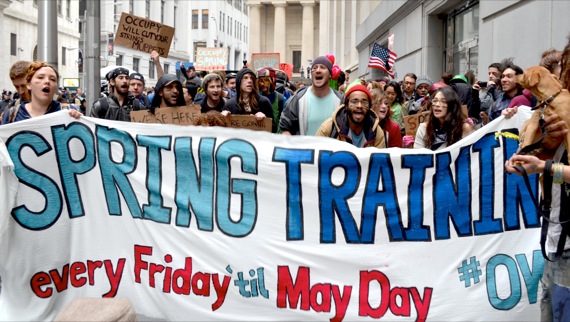This post is updated and adapted from an answer I gave to the question ‘Are we in the beginning, middle, or end of the Occupy Movement?’ while a panellist at Media@McGill’s “Media, Politics and Protest Camps in the Occupy Social Movement” event 27 Jan 2012.
Back in October 2011, we heard from philosopher and public intellectual Slavoj Zizeck that Occupiers should not fall in love with themselves. I think it is also imperative that Occupy does not fall in love with failure. Capitalism loves failure. You lost your job, you are failure. You cannot support your family, you are a failure. You are poor, you are a failure. And of course, we learn this first in school where if you do not learn how you are supposed to, you fail. Most of all, the government officials, the corporations and the professional politicians all want this movement to fail. Let’s not forget that. And let’s not make it easy for them to say it.
The challenges and criticisms piled onto Occupy by participants, supporters and onlookers are, for me, the reason I say we are in the middle of the Occupy Movement. Some of these criticisms should be thrown out, but others demand attention and time and hard work. I think this winter offered time to dig in there and sift through it all and filter out what needs attention, as many Occupy groups and supporters are continuing to do.
One thing that I want to sift out is around discussions of inclusion and equality and the processes of alternative governance and decision-making that have become popularised particularly in North America by Occupy.
Direct democracy is an amazing intervention to see happening on this scale. Occupy has brought out many people who say there is something wrong with Our Democracy, with our economy, with corporations. These are incredible things.

Bec Young
For those of us engaged in traditions of consensus, of self-directed communities and participatory politics, it is profound to see these indigenous, anarchist, feminist and ecological tools for organising people enter into a broad-based social movement.
But when Occupy says ‘direct democracy’ what visions of Democracy are brought into Occupy? A lot of camps struggled with questions around inclusion. Many people brought forward traditional notions of Equality and Liberty. I think it is important to be critical of this. To remember that these terms themselves arise out of colonial histories wherein people are not equal and are not all oppressed in the same ways—as the 99%.
So for me there is a question that I don’t think has ever come before at this scale – and that is what happens when these tools that are about challenging and transforming how we even think about huge ideas like Equality butt heads with the traditional notions of Equality many people bring to the movement?
These traditional notions of Equality cannot account for the ways that different bodies and different voices have different amounts of power. So when we do consensus, when we do a general assembly and we do not acknowledge or configure these difference into our politics, ruptures occur, movements split and grow weary.
For Occupy to remain salient and relevant to existing communities of struggle and to reach out to broader publics requires that we strengthen ourselves and our movements, sharing skills, doing public education, rethinking some of the structures of Occupy that have become fetishized even when they are not working. We need to ask: What should we take along and what should go in the compost as we move forward to #OccupySpring?


Pingback: Warwick University on Occupy London | Protest Camps